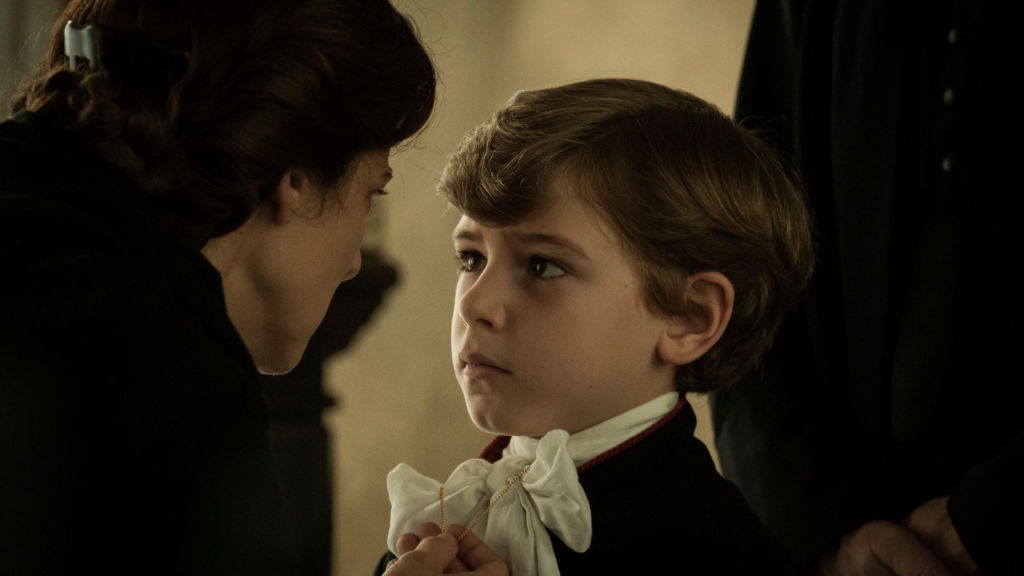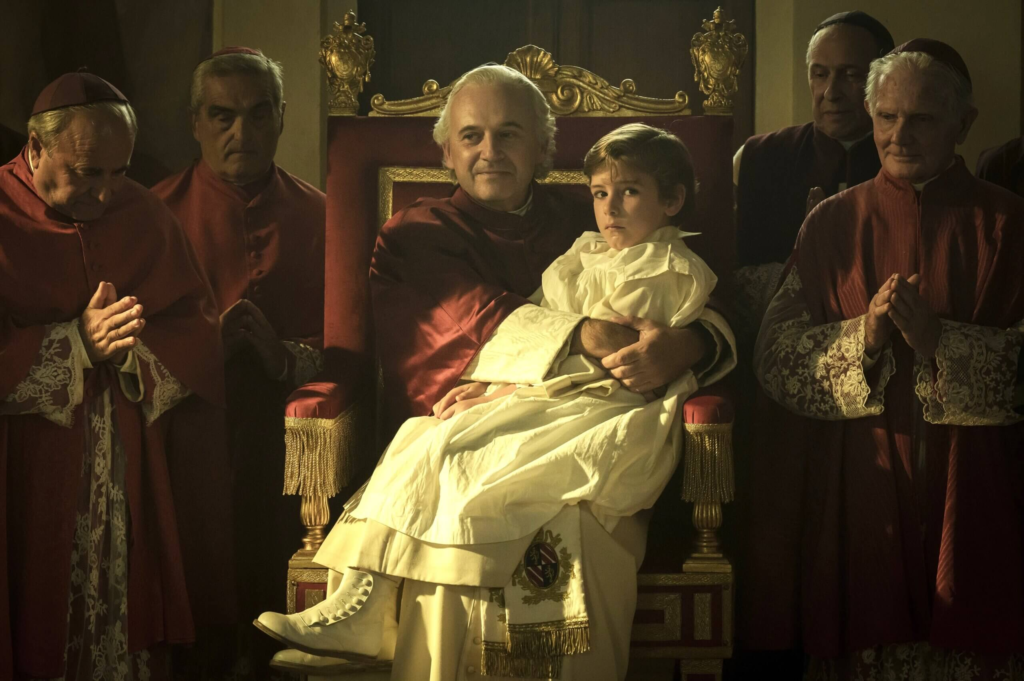Director: Marco Bellocchio
Writers: Marco Bellocchio, Susanna Nicchiarelli, Edoardo Albinati
Stars: Paolo Pierobon, Fausto Russo Alesi, Barbara Ronchi
Synopsis: A Jewish boy is kidnapped and converted to Catholicism in 1858.
Marco Bellocchio’s Kidnapped: The Abduction of Edgardo Mortara uses the case of the titular character, a young Jewish boy who was taken from his family in 1858 by the Catholic Church, as the conduit to investigate zealotry informed by the idea of Papal supremacy. A protracted battle to have the child (Enea Sala) returned to his family became a lightning rod through which Pope Pius IX’s (Paolo Pierobon) position as temporal ruler became seen as no longer viable.
Bellocchio and co-writer Susan Nicchiarelli are less interested in the facts of the case than they are in what it revealed about the Catholic Church and law at the time. Even with that focus, they refine further to make it a psychodrama where the mind of a child is emblematic of the splintered states around the period of Italian Unification.

In Bologna, the prosperous Jewish Mortara family live quietly. Momolo (Fausto Russo Alesi) and Marianna (Barbara Ronchi) have a large and happy family. They practice their religion at home as there are no synagogues. A possible (but unlikely) baptism by a young domestic servant of the baby Edgardo later leads to the local Inquisitor Gaetano Feletti (Fabrizio Gifuni) sending Papal soldiers to take the child to Rome to live as a Christian. It is an act which not only violates parental rights but is also forced conversion – a practice which was increasingly frowned upon.
There is little doubt that, for Feletti, it is motivated by antisemitism as he makes it impossible for Momolo to fight the proceedings. He calls them “perfidious Jews” and not so subtly threatens Molomo and his brother-in-law. Even sympathetic Catholics cannot stop Edgardo being ripped from his home. Momolo does all he can to stop his son panicking. The child asks, “Will they chop off my head, Papa?” Momolo responds, “No, they won’t hurt you.” What Edgardo goes through is beyond hurt – it is a complete erasure.
There is a deliberate surrealism in Edgardo’s journey via canals and waterways to Rome. He sees a funeral parade and encounters the crucifixion for the first time. He is told Jesus was a Jew who converted and then was killed by Jews. The Christ figure becomes a terrifying symbol for the child as he cannot understand the violent sacrifice of the body. Nothing makes sense to a six-year-old who was playing with his siblings one day and was then a pawn for the Church to prove baptism cannot be undone.
When Pope Pius IX is introduced, it is as a man who is increasingly obsessive and illogical. Surely the fact he partially liberated the Rome ghetto is proof enough that the Jews should be grateful for his largesse? He repudiates Rothschild and the amount of money the papacy owes. He has nightmares that he will be circumcized by force in his bedchamber brought on by European and American political cartoons lampooning what they see as his overstepping his authority with Edgardo and other Jewish children housed in the ‘orphanage’. Marco Bellocchio’s vision of the church is one which is decadent and crumbling – the wealth is undeniable – and that is seen as obscene.
Pius and his council are psychologically coercive. The child Edgardo follows the example of Elia (Christian Mudu) a young boy from the Rome ghetto who tells him he must pretend to pray the way the priests require or else he will never be free. When the priests note that Edgardo is co-operating, they make the narrative that he is happy as a Christian and wants to convert his family. Edgardo becomes a pet for Pius who reads his conversion as a personal triumph over those questioning the role of the Holy See and dogmatic practices.
Marco Bellocchio moves between artificiality and realism in an attempt to cement the symbolic nature of the film. It is impeccably designed and shot. Sometimes the perfection masks his intent, and the audience is lulled into the sense that Kidnapped is a straight historical drama – something the director of Fists in the Pocket (1965) is not setting out to create. Bellocchio and Nicchiarelli (Miss Marx) provide a history lesson but do so with their own brand of cynicism towards the Catholic Church and those who wield power over others based on protecting their own interests.

Ultimately, Kidnapped is a satirical tragedy. As it shifts from the constant struggles Momolo, Marianna, and Edgardo’s eldest brother Riccardo (Samuele Teneggi) undertake to get Edgardo back to years later where Edgardo (Leonardo Maltese) is a young man in 1870 and a fervent Catholic priest who is quite literally forced to lick the ground where Pius walks. The Papal states topple under Garibaldi, Pius dies years later, and the damage to Edgardo and his family is never repaired because he is so brainwashed he tries to baptise his mother on her deathbed.
Kidnapped is perhaps a little too polished to be the punch Marco Bellocchio is aiming for. Strange but not as strange as it needs to be to convey how absurd the kidnapping was, especially as it benefitted no one. A single line spoken by the child Edgardo after the death of another kidnapped child, Simone, is vital; “We must have not prayed enough. Was it all pointless?” For in the end none of the Mortara family find reconciliation with their lost son, Pope Pius IX ends up as a corpse Father Pio Edgardo contemplates throwing into the Tiber – but history sees him beatified in 2000 by Pope John Paul II. Bellocchio stops short of making a masterpiece with Kidnapped – but nevertheless makes a striking film about a child lost to his family and himself.





